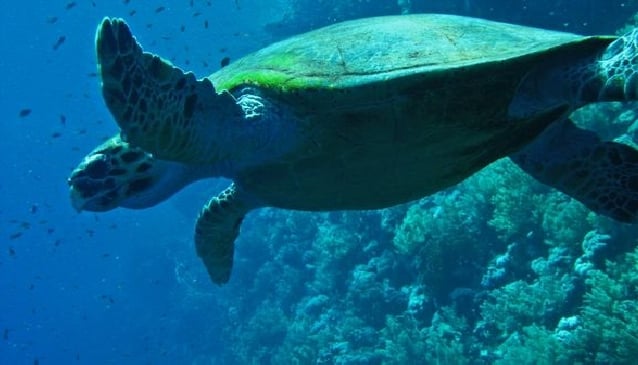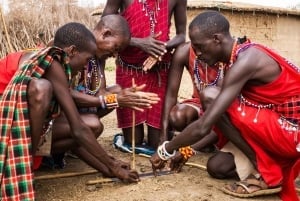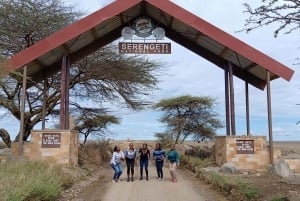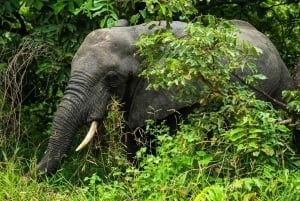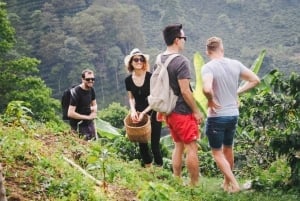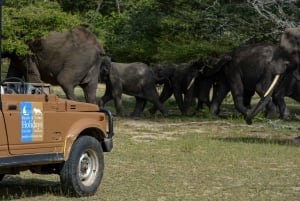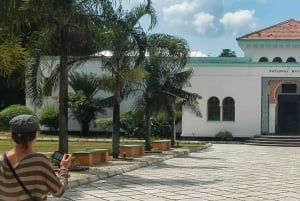Sea Sense
Poaching has gone down 80% since the implementation of the program
Book Top Experiences and Tours in Tanzania:
If youʻre booking your trip to Tanzania last minute, we have you covered. Below are some of the top tours and experiences!- Maasai village visit and chemka hot-springs with hot lunch
- Arusha: Serengeti and Ngorongoro Multi-Day Camping Safari
- From Zanzibar: 3-Day Selous Safari Trip with Flights
- Parasailing Experience with Instructor
- Kilimanjaro: Village Walk, Coffee Tour, Waterfall, and Lunch
is home to two species of sea turtle that come to hatch over its shores: the green turtle and the hawksbill turtle. An endangered species that is threatened by poaching, fishing nets, and degradation of their nesting areas and natural environment, sea turtles can also be seen as a tremendous asset for the socio-economic development of coastal towns.
Sea Sense , a non-profit organisation dedicated to the development of eco-tourism in Tanzania, runs a number of very successful sea turtle programs in the Mafia, Temeke & Pangani districts. The idea is to protect Tanzania's marine biodiversity, while developing a sustainable industry that involves local people and creates work opportunities for them as expert eco-tourism guides.
The choice of sea turtles for eco-tourism developments is not flippant; Sea Sense explains that the turtles have been chosen because they are a critically endangered flagship species, an indicator of a healthy environment, and because they return regularly to the same nesting beaches for a defined incubation period. This recurrence makes it easier both to monitor them and to create opportunities for ecologically-safe human contact that can generate tourism revenue.






Tourism that aids conservation
The numbers of sea turtles in Tanzania are not as big as in other parts of Africa, making it difficult for tourists to see them without a special guided tour. Sea Sense has consistently trained locals as sea turtle guides to help their communities profit from the tourist demand for sea turtle sighting tours. At the same time, people in the communities who are not tour guides are trained to create crafts and turtle souvenirs to offer visiting tourists.
The programs also involve the monitoring of the sea turtles’ habitats and nesting areas, trying to make sure that they have a suitable place to come to hatch, and that they are not disturbed by humans while they are at it. Education is also an important part of the scheme, as both locals and tourists are taught about the importance of sea turtle conservation.
Strategies against threats
The sea turtles on the Tanzanian coasts face various threats. Unfortunately, poaching is still common, and the turtles are often killed for their meat and skin. With education, monitoring and community involvement, eco-tourism projects of this kind can help protect the turtles, while helping the communities socio-economic development.
Most Tanzanians live on the coast, and they rely on everything that comes from the sea for their survival. Sea turtle eco-tourism is showing them that they can receive a better income from becoming involved in sustainable eco-tourism practices, while also protecting their native environment and rich marine biodiversity.




The Mafia Island experience
Mafia Island is home to two-thirds of all Tanzanian sea turtle nests. There are six nesting areas which are constantly monitored and guarded, which may result, for example, in the relocation of nests that are in danger of being flooded after high tides. The program has trained 48 local people, who were elected by the villagers themselves. There is a nest incentive program which pays a small amount to anyone reporting the whereabouts of nests to these trained conservation officers, and there is an extra incentive paid after successful hatching. Poaching has gone down 80% since the implementation of the program, and 50% of the revenue from sea turtle tours goes into an environmental fund for the villages. This way, the villagers can see a direct benefit, which is a great incentive for the expansion and success of the programs.
The future
While the link between eco-tourism benefits and conservation goals may seem very apparent, one of the most important things that needs to be achieved for the future success of these programs is the involvement of the tourism industry. Touristic construction initiatives, which are seen as opportunities for new jobs by locals, can also pose a big threat to the conservation of sea turtle nesting areas. Therefore, eco-tourism needs to develop in harmony with hotels, resorts and other tourism players to ensure that the development of coastal tourism in Tanzania does not work against sea turtle conservation efforts.
So far, results seem very promising, and the synergy created by this initial success will be of great importance both for the future of Tanzanian sea turtles and for the sustainable development of the country's coastal towns.






